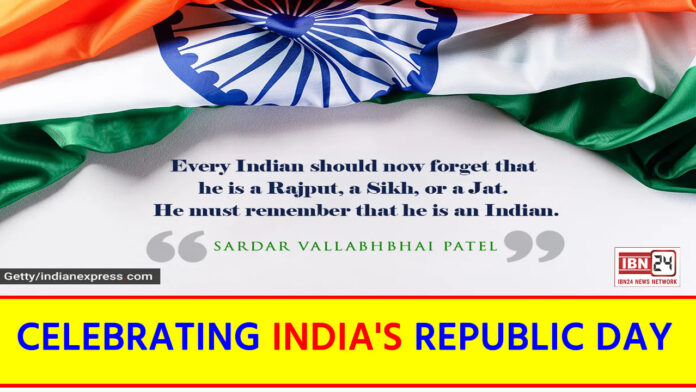India’s Republic Day, celebrated on the 26th of January, holds immense significance in the heart of every Indian. It marks the day when the Constitution of India came into effect in 1950, replacing the Government of India Act (1935) as the governing document, and India officially became a sovereign, socialist, secular, and democratic republic. This day stands as a testament to the nation’s commitment to justice, liberty, equality, and fraternity.

Historical Context:
The journey towards becoming a republic was not an easy one for India. The struggle for independence led by Mahatma Gandhi and various other leaders culminated in the achievement of freedom in 1947. However, the need for a constitution to guide the newly independent nation was realized. Dr. B.R. Ambedkar, the principal architect of the Indian Constitution, played a pivotal role in drafting this historic document. The Constituent Assembly adopted the Constitution on January 26, 1950, ensuring that the ideals of justice, equality, and democracy would be enshrined in the very foundation of the nation.
Symbolism of the Day:
India, known for its rich cultural tapestry, linguistic diversity, and pluralistic society, celebrates its unity in diversity on Republic Day. The parade, with its vibrant display of traditional attire, folk dances, and music from different states, serves as a visual representation of India’s cultural mosaic. The Constitution, with its commitment to protecting the rights of every citizen, regardless of religion, caste, or creed, reinforces the idea of unity in diversity.
Challenges and Progress:
While celebrating the achievements of the past, Republic Day is also a time for introspection. India faces numerous challenges, including poverty, inequality, and social issues. However, the commitment to the principles laid down in the Constitution continues to guide the nation towards progress and development. Republic Day serves as a reminder of the collective responsibility to address these challenges and build a more inclusive and equitable society.
Global Impact:
India’s journey from colonial rule to a vibrant democracy has inspired nations around the world. The values of freedom, justice, and democracy upheld by the Indian Constitution are universal, and Republic Day stands as a beacon of hope for those striving for self-determination and democratic governance.
India’s Republic Day is not only a national celebration but also holds global significance. The nation’s journey from colonial rule to a vibrant democracy has inspired others worldwide. The values of freedom, justice, and democracy upheld by the Indian Constitution resonate universally, making Republic Day a symbol of hope for those striving for self-determination and democratic governance.
Conclusion
As Indians come together to celebrate Republic Day, it is a time to reflect on the shared values that bind the nation and reaffirm the commitment to building a just, inclusive, and prosperous society. The Constitution, as a living document, continues to guide India on its journey, and Republic Day serves as a reminder of the nation’s resilience, diversity, and unwavering commitment to the principles of liberty, equality, and fraternity.
Also read : https://indiabreaking.com/nfiw/
